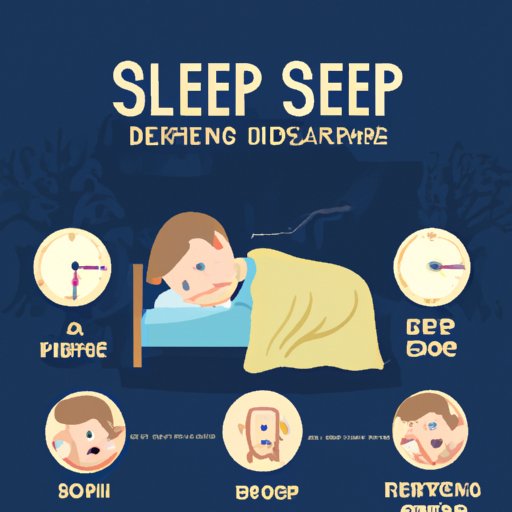Introduction
Do you have difficulty falling asleep? You’re not alone. Many people struggle with falling asleep or staying asleep, which can severely impact their health and well-being. One of the most important stages of sleep is deep sleep, which contributes significantly to overall health and vitality. In this article, we will explore the science of sleep and offer practical tips to help you fall asleep faster and reach deep sleep.
The Science of Sleep: Understanding the Stages of Sleep and How Long It Takes to Get to Deep Sleep
There are two main stages of sleep: non-rapid eye movement (NREM) and rapid eye movement (REM). NREM is further divided into four different stages, with each stage having a specific function. Stage 1 is a transition between wakefulness and sleep, and it takes about 5-10 minutes to get there. Stage 2 is where the body prepares for the deep sleep stage, and it usually lasts between 20-30 minutes. Stages 3 and 4 are the deep sleep stages, also called slow-wave sleep (SWS), and it is where the body repairs and regenerates the muscles, tissues, and organs. REM sleep is the stage where the brain becomes more active, and we dream. It usually takes about 90 minutes to complete an entire sleep cycle, including all the different sleep stages.
Deep sleep is vital for our health as it helps our brain consolidate memories, improves our immune system, and regulates our hormones, among other things. A typical adult needs around 1.5-2 hours of deep sleep every night to function optimally.
Counting Sheep: The Myth of Getting to Sleep Quickly and What Really Happens
Many of us have heard the phrase “counting sheep” as a way to fall asleep quickly. However, research shows that this technique may not be as effective as people believe. Instead, it’s essential to create a relaxing environment that is conducive to sleep. Also, it’s essential to understand the role of our brain in regulating our sleep, and factors like anxiety and stress can have a significant impact on our ability to fall asleep.
The Factors That Influence How Quickly You Reach Deep Sleep
There are several factors that affect sleep quality, including diet, exercise, environment, and pre-sleep routines. For instance, consuming caffeine or alcohol close to bedtime can have a negative impact on our ability to fall asleep quickly and reach deep sleep. On the other hand, having a regular exercise routine can significantly improve sleep quality. Additionally, taking measures to create a sleep-conducive environment, such as reducing noise levels and keeping the bedroom cool and dark, can help improve sleep quality.
Moreover, certain medications and supplements that people take can affect both the quality and length of sleep. For example, over-the-counter medications like antihistamines can cause drowsiness and affect the quality of sleep. Similarly, supplements like melatonin can help regulate sleep cycles, although their effectiveness varies from person to person.
Changing Your Habits to Achieve Quicker Deep Sleep – Tips and Tricks
There are several ways to improve sleep habits and achieve deeper sleep. For instance, it’s essential to establish a regular bedtime routine and stick to it, as it trains our body to know when it’s time to sleep. Additionally, avoiding stimulating activities, such as watching TV or using digital devices close to bedtime, can help our brain relax. Furthermore, creating a quiet and dark bedroom environment can help our body get into sleep mode.
It’s also important to pay attention to our diet, as certain foods can affect sleep quality. Consuming foods that are rich in magnesium, such as nuts and leafy greens, can help promote sleep. Additionally, herbal tea, like chamomile, can have a calming effect on the body, making it easier to fall asleep.
Measuring Your Progress: How Long Does it Really Take You to Get to Deep Sleep?
Tracking sleep progress can help people identify patterns and make informed decisions about their sleep habits. Using wearable technology, such as fitness trackers and smartwatches, can help you monitor your sleep and identify areas where you need to improve. Additionally, keeping a sleep diary can help you understand how specific behaviors or activities affect your sleep quality.
It’s important to acknowledge that everyone’s sleep needs are different, and progress towards achieving deeper sleep is relative. However, the benefits of deep sleep are vital for our health, and taking small steps towards improving our sleep habits can make a significant difference.
Conclusion
Sleep is an essential aspect of our overall health and well-being. Deep sleep, in particular, is a crucial stage of sleep that contributes significantly to our mental and physical health. By understanding the science of sleep and making simple changes to our habits, we can improve our sleep quality and achieve deeper sleep. Monitoring our progress and staying motivated to make positive changes can have a significant impact on our health and well-being.
(Note: Is this article not meeting your expectations? Do you have knowledge or insights to share? Unlock new opportunities and expand your reach by joining our authors team. Click Registration to join us and share your expertise with our readers.)
